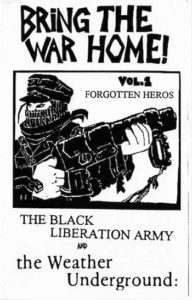
*Black history and the Weather Underground Organization (WUO) in America are affirmed on this date in 1969.
The Weather Underground was a radical left militant organization active in the late 1960s and 1970s, founded on the campus of the University of Michigan. It was initially called the Weathermen. The WUO was organized that year as a faction of Students for a Democratic Society (SDS). At the SDS national convention, the Third World Marxists presented a position paper titled "You Don't Need a Weatherman to Know Which Way the Wind Blows" in the SDS newspaper, New Left Notes.
The title was taken from a song by musician Bob Dylan, which asserted, among other things, that black liberation was vital to the movement's anti-imperialist struggle. It emphasized the need for a white revolutionary movement to support liberation movements internationally. The article became the founding statement of Weatherman.
Frustrated with the inefficacy of traditional forms of political protest after "Days of Rage" and other antiwar demonstrations throughout November 1969, Weatherman members called for a national "war council" meeting of the SDS that December. Members of the group discussed the need to instruct themselves in using firearms and bombs to target and attack sites of power in the United States and addressed the need to kill police. Much of this discussion was fueled by the killing of two party leaders of the Black Panthers, Mark Clark and Fred Hampton, by Chicago police.
The WUO was a faction of Students for a Democratic Society (SDS) composed mainly of the national office leadership of SDS and their supporters. In 1974, the organization's stated political goal was to establish a revolutionary party to overthrow what it perceived as American imperialism. The WUO took its name from Bob Dylan's lyric, "You don't need a weatherman to know which way the wind blows," from the song "Subterranean Homesick Blues" (1965). That Dylan line was also the title of a position paper distributed at an SDS convention in Chicago on June 18, 1969.
This founding document called for a "white fighting force" to be allied with the "Black Liberation Movement" and other radical movements to achieve "the destruction of U.S. imperialism and form a classless communist world." The FBI classified the WUO as a domestic terrorist group with revolutionary positions characterized by Black Power and opposition to the Vietnam War.
The WUO took part in domestic attacks such as the jailbreak of Timothy Leary in 1970. The "Days of Rage" was the WUO's first riot in October 1969 in Chicago, timed to coincide with the trial of the Chicago Seven. In 1970, the group issued a "Declaration of a State of War" against the United States government under the name "Weather Underground Organization."In the 1970s, the WUO conducted a bombing campaign targeting government buildings and several banks. Some attacks were preceded by evacuation warnings and threats that identified the matter the attack protested.
Three group members were killed in an accidental Greenwich Village townhouse explosion, but none were killed in bombings. The WUO communiqué issued in connection with the bombing of the United States Capitol on March 1, 1971, indicated that it was "in protest of the U.S. invasion of Laos ."The WUO asserted that its May 19, 1972, bombing of the Pentagon was "in retaliation for the U.S. bombing raid in Hanoi ."The WUO announced that its January 29, 1975, bombing of the United States Department of State building was "in response to the escalation in Vietnam ."The WUO began to disintegrate after the United States reached a peace accord in Vietnam in 1973, and it was defunct by 1977.
The Weather Underground was referred to as a terrorist group in articles by The New York Times, United Press International, and Time Magazine. The group also fell under the auspices of the FBI-New York City Police Anti-Terrorist Task Force, a forerunner of the FBI's Joint Terrorism Task Forces. Some members have disputed the "terrorist" categorization and justified the group's actions as an appropriate response to what they described as the "terrorist activities" of the war in Vietnam, domestic racism, and the deaths of black leaders.
Bill Ayers objected to describing the WUO as a terrorist in his 2001 book Fugitive Days. "Terrorists terrorize," he argues, "they kill innocent civilians while we organized and agitated. Terrorists destroy randomly, while our actions bore, we hoped, the precise stamp of a cut diamond. Terrorists intimidate, while we aimed only to educate." Dan Berger asserts in Outlaws in America that the group "purposefully and successfully avoided injuring anyone" as an argument that their actions were not terrorism. "It's war against a property, by definition, means that the WUO was not a terrorist organization."
Others, however, have suggested that these arguments are specious. Former Weather Underground member Mark Rudd admitted that the group intended to target people before the accidental townhouse explosion. Rudd teaches mathematics at Central New Mexico Community College, and he has said that he doesn't speak publicly about his experiences because he has "mixed feelings, guilt, and shame ."I am not proud of these things, and I find it hard to speak publicly about them and tease out what was right from what was wrong."